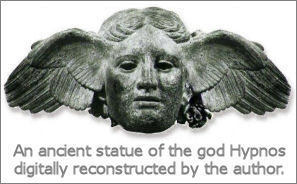What is Hypnosis and Hypnotherapy?

By Tom Connelly D.Hyp, FBSCH
The word 'Hypnosis' was first coined by Dr James Braid in 1841 to describe the state that ensued when his patients became fixated, or deeply concentrated on an object. The word hypnosis was taken from the Greek god called 'Hypnos' the god of sleep and dreams. Later Braid would try to rename the science he helped birth because he realised that hypnosis was not really a relative of the sleep state but it was too late and the term passed into public use.
He actually preferred the term 'monoideism'.

In 1842 he published "Neurypnology or The Rationale of Nervous Sleep Considered In Relation With Animal Magnetism."
Even though the naturally occurring state represented by the word hypnosis has been around since mankind has had a mind it wasn't until Braid's studies of the state that it achieved a form of respectability. Up to this point it was the domain of magicians, priests, magnetisers and charmers, etc.
Along with Dr Braid two other medical men took up his work and performed many surgeries in the mid 1800's using only hypnosis for anaesthetic, these were Dr Elliotson and Dr Esdaile. Not only were these operations considered relatively pain free but the mortality rate was much lower than operations which were carried out without anaesthetic or with alcohol intoxication. Many scientific researchers of the period began to examine the state of hypnosis for its practical use in medicine but a further scientific development of a more material nature was to end this search almost before it had begun. The nemesis of hypnotherapy was the invention and use of chloroform as an anaesthetic. Even though the use of chloroform presented more danger to the patient than the use of hypnosis (at least in the early days) it was easy to apply and the results predictable. Perhaps more significant was the fact that no understanding of the human mind was required - a legacy which dogs the medical profession even today. Happily hypnosis was not forgotten and a new science was eventually to come into being which would further the investigation and create many of the techniques used in modem hypnotherapy, the new science of Psychology.
So what is Hypnosis?
We know that hypnosis is a naturally occurring state which appears when certain psychological and physiological conditions are met. These are usually bodily stillness and relaxation (mimicking the sleeping posture), eyes closed (reducing visual stimulation), focus on feelings (internalising awareness) and perhaps concentration on the hypnotists voice. Monotony can also trigger this state as the conscious mind drifts from the normal focus of outward attention onto an internal train of thought. Fascination (such as being engrossed in a book or film) is also a doorway into hypnosis. The experience of hypnosis is similar to a dream-like reverie, being neither asleep nor awake but focused (or absorbed) around some point and usually (though not essentially) in a state of physical and mental relaxation.
So what is Hypnotherapy?
The thing that makes hypnosis useful is that people can become more open to suggestion. In fact the whole modus operandi of hypnotherapy is to utilise this state of heightened suggestibility (or lack of criticality) found in hypnosis to 'plant' or change instructions already held at an unconscious level which are affecting behaviour. So hypnotherapy - through hypnosis, is a means of modifying the patterns of belief held by a person.
It's as if the mind is made up of two parts which have different functions: there is the wakeful conscious part and there is the dream-like unconscious part. One of the functions of the wakeful part is to notice the difference between things, especially between true and false, or real and not real. The unconscious part does not seem to have this ability in a pronounced form and tends to accept all perception as real. Some evidence of this comes from our nightly dreams, which are often quite impossible or absurd, yet while we are in the dream we feel they are very real because the wakeful conscious mind is asleep.
The talent of the unconscious mind seems to be long term memory and conditioning, so it is here that the therapist must look for traumatic memory and factors sustaining habits and irrational fears, etc.
Hypnotherapy is a valuable technique in the hands of a skilled professional and can help in the resolution of many problems.
